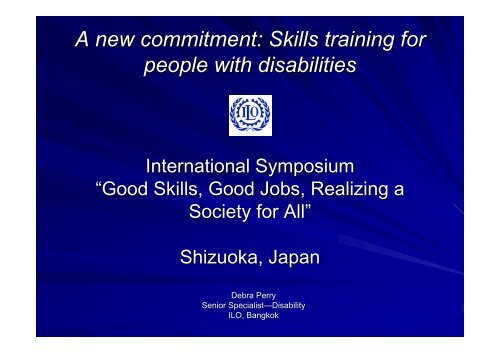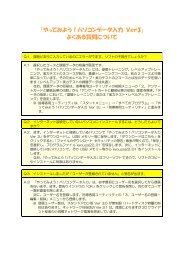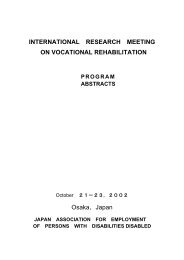A new commitment: Skills training for people with disabilities
A new commitment: Skills training for people with disabilities
A new commitment: Skills training for people with disabilities
You also want an ePaper? Increase the reach of your titles
YUMPU automatically turns print PDFs into web optimized ePapers that Google loves.
A <strong>new</strong> <strong>commitment</strong>: <strong>Skills</strong> <strong>training</strong> <strong>for</strong><br />
<strong>people</strong> <strong>with</strong> <strong>disabilities</strong><br />
International Symposium<br />
“Good Good <strong>Skills</strong>, Good Jobs, Realizing a<br />
Society <strong>for</strong> All” All<br />
Shizuoka, Japan<br />
Debra Perry<br />
Senior Specialist—Disability<br />
Specialist Disability<br />
ILO, Bangkok
A <strong>new</strong> <strong>commitment</strong><br />
Trends and <strong>training</strong><br />
Practical strategies<br />
Who?<br />
What?<br />
When?<br />
Where?<br />
How?<br />
Topics
What is decent work?<br />
Productive work in conditions of<br />
– Freedom<br />
– Equity<br />
– Security<br />
– Human Dignity<br />
For woman and men everywhere.<br />
People <strong>with</strong> <strong>disabilities</strong> have a right to decent work<br />
<strong>Skills</strong> increase the chance of getting decent work
Current status… status<br />
Dramatic changes<br />
Policies<br />
– Vocational Rehabilitation; social<br />
welfare; employment services<br />
– Right to <strong>training</strong><br />
– Anti-discrimination<br />
Anti discrimination<br />
Segregated settings<br />
– Most common<br />
Secondary schools<br />
Mainstream settings<br />
Systems in transition<br />
Greater workplace emphasis
Why a <strong>new</strong> <strong>commitment</strong>?<br />
Poorest of the poor<br />
Exclusion and discrimination<br />
Less educated<br />
Most lack vocational <strong>training</strong><br />
Training in stereotypical, low-paying low paying jobs<br />
Limited mainstreaming<br />
Women/rural residents particularly<br />
disadvantaged
New trends<br />
New challenges<br />
Why now?<br />
Growing awareness<br />
New knowledge---<br />
knowledge---<strong>new</strong><br />
<strong>new</strong> approaches
Disability Trends and Training<br />
Human rights issue<br />
Economics of disability<br />
Globalization<br />
The New Disability<br />
Business Case
Human rights Rights<br />
issue<br />
People <strong>with</strong> <strong>disabilities</strong>:<br />
Citizens like non-disabled<br />
non disabled--- ---birthright birthright<br />
Have not had access to same rights<br />
Represent enormous, untapped potential<br />
A shift in focus from “fixing fixing” the person to<br />
“fixing fixing” society…<strong>training</strong> society <strong>training</strong> systems!
Economics Economics<br />
of disability<br />
Cost of exclusion: Up to $5,135 per person annually<br />
Opportunity costs<br />
No social protection schemes: Only source of income<br />
Social protection schemes exist: Skyrocketing costs<br />
Labour shortages/skills mismatch<br />
Turning to untapped resources
Globalization Globalization and and the workplace<br />
Knowledge economy<br />
Use of ICT<br />
Increased competition <strong>for</strong> good jobs<br />
Skill flexibility and multitasking<br />
<strong>Skills</strong> mismatch<br />
<strong>Skills</strong> shortages<br />
High youth unemployment<br />
More precarious and non-standard<br />
non standard<br />
employment
The New Business Disability case<br />
Business Case<br />
Diversity<br />
Corporate social<br />
responsibility<br />
Team work<br />
Good workers<br />
Customers<br />
The bottom line:<br />
Hiring and retaining disabled/injured workers makes business sense
Choice<br />
Options<br />
The <strong>new</strong> <strong>commitment</strong>…<br />
<strong>commitment</strong><br />
2007<br />
Support and<br />
accommodation<br />
Accountability<br />
Willie Momm, Shiba<br />
Japan,1995<br />
Choice<br />
Options<br />
Accommodation<br />
(Tools)<br />
Quality standards and<br />
effectiveness
Practical strategies…<br />
strategies<br />
Who: Should be trained?<br />
Has a role?<br />
What: Types of skills should be taught?<br />
When: Should <strong>people</strong> get trained?<br />
Are the key transition points?<br />
Where: Should <strong>training</strong> take place?<br />
How: Can it all be done?
Who to train? All disabled persons
The stories of two men…<br />
men
The story of Hang Hach
Who has a role?<br />
Every sector… sector<br />
International organizations<br />
Government<br />
Schools and universities<br />
INGOs and NGOs<br />
Employers<br />
Trade unions
What? Types of skills<br />
1. Hard <strong>Skills</strong><br />
– Technical<br />
– IT skills<br />
2. Soft skills<br />
– Communication<br />
– Life skills<br />
– Teamwork, problem-solving<br />
problem solving<br />
3. <strong>Skills</strong> <strong>for</strong> employment<br />
– Job seeking skills<br />
– Self-employment<br />
Self employment
Houston Community College:<br />
Life skills-1991 skills 1991<br />
Multiple skills <strong>for</strong> PwDs<br />
School-to School to-work work transition<br />
<strong>training</strong><br />
Classroom based technical<br />
skills <strong>with</strong> internship<br />
IT office skills<br />
Mentoring<br />
Fund <strong>for</strong> accommodations<br />
Champions<br />
Guidance and placement<br />
400 students per year<br />
75-100% 75 100% success rate
What? IT<br />
Training<br />
HSBC Bank advises<br />
on latest in IT <strong>for</strong> work<br />
PwDs <strong>with</strong> IT<br />
Training more<br />
likely to get jobs
What? Employment skills<br />
For <strong>for</strong>mal sector jobs--- jobs---Job<br />
Job<br />
seeking skills <strong>training</strong> and<br />
supports<br />
Self employment <strong>training</strong><br />
– Market analysis<br />
– Business management<br />
– Business development<br />
– Special supports<br />
– Credit<br />
– Tool kits<br />
– Linkage to community services<br />
– Follow-up Follow up
When? Lifelong learning <strong>for</strong> all<br />
Learn through the entire lifecycle<br />
Changing job market demands<br />
Learner is central<br />
Motivation crucial<br />
Objectives may change<br />
Recognize all types of learning
When? Timely interventions<br />
Early career guidance/planning<br />
School to <strong>training</strong> transition<br />
Training to work transition<br />
Follow-up Follow up<br />
Skill upgrades<br />
Lifelong learning opportunities<br />
Re<strong>training</strong> <strong>for</strong> injured workers
Where?<br />
Special<br />
segregated<br />
settings<br />
Home or<br />
business<br />
Inclusive<br />
Systems<br />
Work<br />
place<br />
Community
Where? Inclusive system<br />
Chose among options<br />
PwDs involved<br />
Barrier-free Barrier free environment<br />
Adapted teaching<br />
methods<br />
Assistive learning devices<br />
Career guidance<br />
Market-driven Market driven <strong>training</strong><br />
Positive attitudes fostered<br />
Staff trained in disability<br />
Disability specialists<br />
Employer involvement<br />
Adequate resources<br />
School to <strong>training</strong><br />
institution to work linkages<br />
Job placement services<br />
Integration not enough;<br />
true inclusion involves<br />
necessary supports<br />
----Findings ----Findings<br />
of the Expert<br />
Group Meeting, Feb 2006
Australian Experience: Bridging pathways<br />
A national strategy<br />
Increase inclusion<br />
Systems change<br />
Partnerships<br />
Training equity package<br />
Disability coordination<br />
officers<br />
Research<br />
Measuring of results<br />
State-level State level<br />
implementation
Bridging Pathways---<br />
Pathways---Why<br />
Why<br />
Legislation: Disability<br />
Discrimination Act review--- review--<br />
ineffective in reducing<br />
discrimination especially in<br />
employment and <strong>training</strong><br />
Aging population<br />
Costs of disability and welfare<br />
dependence<br />
Labour shortages<br />
Of general working age<br />
population—11.8 population 11.8 % in VT; of<br />
disabled, only 3.3%<br />
Most middle-age; middle age; soon will be<br />
senior citizens<br />
Current costs very high; will get<br />
worse<br />
Not enough skilled workers to<br />
meet demands
Four Goals:<br />
1. Open the door<br />
2. Improve learning<br />
experiences<br />
3. Achieve employment and<br />
lifelong learning<br />
outcomes<br />
4. Create an accountable<br />
system
Example and outcomes…<br />
outcomes<br />
Adelaide Institute of TAFE: Working <strong>with</strong> the<br />
Deaf<br />
Disability Liaison Officer<br />
Special outreach<br />
Interpreters and other<br />
accommodations<br />
Literacy groups<br />
Staff and teacher <strong>training</strong><br />
Outcomes<br />
Percentage of VET<br />
students <strong>with</strong> <strong>disabilities</strong><br />
increased<br />
Systemic supports<br />
increased enrollment<br />
Employment among<br />
PwD graduates<br />
increased
Where? Workplace…<br />
Workplace<br />
On-the On the-job job <strong>training</strong><br />
Apprenticeships---<br />
Apprenticeships---<strong>for</strong>mal<br />
<strong>for</strong>mal and in<strong>for</strong>mal<br />
Transitional workshops<br />
Social enterprises<br />
Supported employment and job<br />
coaching
On-the On the-job job <strong>training</strong>--- <strong>training</strong>---Accor<br />
Accor Hotels, Shanghai<br />
Provides on the job<br />
<strong>training</strong> in a variety of<br />
jobs <strong>for</strong> <strong>people</strong> <strong>with</strong><br />
intellectual, physical and<br />
hearing impairments<br />
The Shanghai Disabled<br />
Persons Federation pays<br />
a <strong>training</strong> salary to the<br />
participants, recruits<br />
candidates and provides<br />
support as needed
Accor/Shanghai DPF<br />
Accor provides <strong>training</strong><br />
in housekeeping,<br />
kitchen, laundry, etc.<br />
The hotel takes about<br />
20 trainees every 6<br />
months<br />
When <strong>training</strong> is over,<br />
CDPF and the Accor<br />
manager find jobs <strong>for</strong><br />
graduates in 4 and 5-<br />
star hotels
Accor Hotels, Shanghai: Hiring ability<br />
Benefit: Accor hires the most talented of<br />
its trainees, such as this young deaf<br />
man, (his supervisor learned to sign), is<br />
socially responsive
New examples<br />
from New Life… Life<br />
Social enterprises<br />
Operate stores,<br />
kiosks, restaurants,<br />
etc.<br />
Organic grocery<br />
New Life farm
7-11 11 Franchise<br />
Rehabilitation Alliance of Hong Kong<br />
is a self-help group of more that 1,800<br />
members representing all disability groups<br />
Purchased a 7-11<br />
store<br />
Accommodations<br />
included extensive<br />
<strong>training</strong> and a job<br />
coach<br />
Loan repaid in 3<br />
years and won<br />
awards <strong>for</strong> excellence<br />
Now owns three other<br />
stores
Supported employment and job coaching<br />
Definitions vary<br />
Paid work<br />
Integrated settings<br />
Ongoing support often job coaches<br />
Intellectual and psychiatric <strong>disabilities</strong>
New Life Psychiatric Center, Hong Kong SAR
Where? Community-based<br />
Community based<br />
Community based rehabilitation<br />
Transitional community workshops<br />
Mainstream community <strong>training</strong><br />
programmes<br />
Peer <strong>training</strong><br />
Distance learning
ILO TREE project<br />
Based on ILO community-based<br />
community based<br />
<strong>training</strong> model<br />
An integrated <strong>training</strong> and employment<br />
promotion project<br />
Community economic empowerment<br />
Community decides<br />
Training locally determined by market<br />
Training delivered at community level
ILO TREE project in Pakistan
ILO APPT project in Cambodia<br />
• Village or home-based<br />
home based<br />
<strong>training</strong><br />
• By successful<br />
entrepreneurs<br />
• One to one<br />
• <strong>Skills</strong> based on market<br />
needs<br />
• Learn technical and<br />
business skills<br />
• Grants, loans, start-up start up<br />
support<br />
• Successful trainees<br />
become trainers<br />
• Follow-up Follow up
APPT/peer <strong>training</strong> in Cambodia
Distance learning…Russia<br />
learning Russia<br />
Many opportunities<br />
Advantages<br />
Disadvantages<br />
Example from Russia<br />
– Government-sponsored<br />
Government sponsored<br />
– University-operated<br />
University operated<br />
– Internet classes in barrier-free barrier free<br />
settings<br />
– State certification<br />
– Higher education: Law,<br />
management, finance,<br />
computer engineering, etc.<br />
– Allows <strong>for</strong> group interaction<br />
Graduation<br />
Taking a course
Form partnerships<br />
How?<br />
Provide accommodations and<br />
supports to overcome barriers:<br />
– Physical<br />
(e.g. architectural and transport)<br />
– In<strong>for</strong>mation and communication<br />
(e.g. inaccessible <strong>for</strong>mats)<br />
– Institutional and systematic<br />
(e.g. policy, implementation)<br />
– Attitudinal<br />
(e.g. negative attitudes and<br />
stereotypes)
KEPAD and CJ Telenix<br />
CJ Telenix Human<br />
Resource Officer Sung<br />
Joo Kim: “We have<br />
thrown away the<br />
stereotype that<br />
disabled <strong>people</strong> are<br />
less productive, our<br />
case proves it.”
CJ Telenix and KEPAD<br />
CJ Telenix:<br />
• Accepts 17% of applicants<br />
• Builds work stations in home<br />
• Supervises using real-time video<br />
• Home offices 20 higher in costs<br />
• Return on investment realized in<br />
productivity; employee satisfaction<br />
• Bi-monthly visits to office<br />
KEPAD:<br />
•Recruitment<br />
•Pre-employment <strong>training</strong><br />
•Consultation<br />
• Subsidies
EFC’s EFC s Employers’ Employers Network on<br />
Disability in Sri Lanka<br />
Selected Activities<br />
Model employer<br />
Research survey<br />
Database and Web site<br />
Employer awareness seminars<br />
Good practice examples<br />
Partners <strong>with</strong> NGOs and government<br />
Job fairs<br />
Employers hire<br />
Advise and provide <strong>training</strong><br />
Nestle: Awareness campaign<br />
Standard Chartered: Accessibility Guide<br />
Code of Practice
Marriott in Hong Kong<br />
Partnership <strong>with</strong> Hong Chi<br />
Association<br />
Housekeeping <strong>training</strong><br />
On-the On the-job job <strong>training</strong> at Marriott<br />
Six trainees are associates---<br />
associates--<br />
seven in <strong>training</strong><br />
Sell pottery products in hotel<br />
Developing bakery unit<br />
Developing herb garden<br />
Building a sensory garden<br />
Received two local awards and<br />
Marriott Award <strong>for</strong> Community<br />
Service
Partnering <strong>with</strong> trade unions…<br />
unions
Accommodations and supports …<br />
Barrier<br />
Physical<br />
In<strong>for</strong>mation/<br />
communication<br />
Systematic/<br />
institutional<br />
Attitudinal<br />
Accommodation Example<br />
Universal design<br />
Tools and equipment<br />
Accessible <strong>for</strong>mats<br />
Interpreters<br />
Learning adjustments<br />
Rights-based Rights based policies<br />
En<strong>for</strong>cement<br />
Disability awareness<br />
<strong>training</strong><br />
Active inclusion
Help<br />
Wanted
Four pillars<br />
Choice<br />
Options<br />
Accommodations and<br />
supports<br />
Accountability<br />
Summary<br />
Practicalities<br />
Who: Training <strong>for</strong> all<br />
All sector involved<br />
What: Hard and soft skills<br />
When: Lifelong<br />
Where: Mainstream and<br />
community<br />
How: Partner,<br />
Accommodate
For more in<strong>for</strong>mation<br />
ILO Web sites<br />
http://www.ilo.org/employment/disability<br />
http://www.ilo.org/abilityasia

















